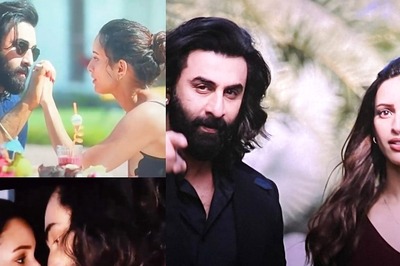
views
With an overwhelming number of biopics released in recent years, Bollywood saw films made on politicians, achievers, gangsters, freedom fighters and sport personalities. The trend has stayed in 2020.
However, many of the biopics were accused of being very far from reality. There has been a pertinent question: how much creative liberty can a filmmaker take while making a biopic?
For Anu Menon, who directed Shakuntala Devi, it is very important how a filmmaker chooses the film’s point of view to show a person’s life. She is not in favour of narratives that conform the truth to satisfy the film’s story.
She tells us, “I’m personally against revisionist stories that adapt truth to suit the film’s narrative. For example, Shakuntala Devi has a pretty dramatic climax and it really happened! We didn’t have to fabricate things. We worked really hard in being true to Shakuntala’s spirit and her relationship with her daughter. But you have to remember content and form are different things – a mainstream film comes with its own cinematic language and you will obviously adapt the story to that.”
“For me, it’s very important that the film is authentic! Which is why it is important to choose the POV that gives you the most access to the subject and allows you to go into grey areas as well. In India especially, the legal implications are too huge if you don’t have the right kind of rights – you can be sued easily – which is why there’s a tendency to make up stuff,” she added.
Filmmaker Hansal Mehta, who has made as many as six biopics — Shahid, Aligarh, Omerta to name a few — says most biopics are dramatised versions of a person’s life. For him, creative liberty is not a question of how much!
“Creative liberty is what you normally do with a biography to understand the person and try to communicate the person’s life through your screenplay. And for that, you have to dramatise. A filmmaker does that to embody the spirit of that person and his work.”
Citing examples from his own films, Mehta explained, “I made Shahid that covered 17 years of the protagonist’s life. If I am covering 17 years and I am showing you that in two hours, I have to dramatise his life. But it had to be made sure that the film embodies the spirit and soul of the character. And it is not necessary that every film covers that long span of a person’s life.
“For instance, in Aligarh, I only showed three months of that professor’s life but through these three months you get to know a person and his life well enough. So you use various storytelling devices to be able to convey a person’s life and philosophy.”
Echoing similar sentiments, Menon says there are no rights or wrongs in how a filmmaker chooses to show a person’s journey. She emphasised that it’s the prerogative of the filmmaker what aspect of the subject they want to concentrate on.
She said, “A POV can’t be right or wrong. There are many amazing biopics that deal with really personal aspects of lives, like The Theory of Everything is a romantic drama about Stephen Hawking’s relationship with his wife. Likewise, the film Jackie follows her life days after her husband (John F Kennedy) was shot dead – it’s that specific!”
However, Menon prefers biopics that humanises its subjects and digs deeper.
“Just putting a person on a pedestal doesn’t work for me – that would be an ad for that person! Not a film with conflicts,” she said.
Author Harinder Sikka, whose book Calling Sehmat was adapted into a film titled Raazi by Meghna Gulzar, talks about ethics. He said, “Creative liberty shouldn’t damage the institution. You need to create a balance, but that balance shouldn’t be negative.”
So, is it okay to add some fictional elements to the story for a film?
“Not fictionalisation, but dramatisation. Fiction is something which is completely out of imagination, whereas, dramatisation is when you imagine the circumstances of a true situation and present it in a cinematic form. There’s a distinction. I don’t talk about others, but I dramatise,” Mehta said.
With more biopics lined up for release, the audience will keep judging between dramatisation and fictionalisation.




















Comments
0 comment